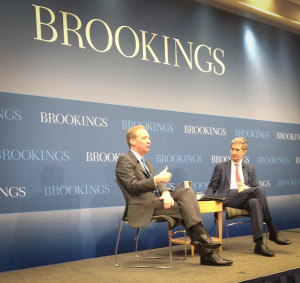
Microsoft Executive Vice President and General Counsel Brad Smith (left) and Cameron Kerry discuss the future of global technology, privacy, and regulation at The Brookings Institution on June 24, 2014.
Yesterday, Microsoft General Counsel Brad Smith addressed a packed room at Washington’s Brookings Institute on the future of global technology, privacy, and regulation . It’s been more than a year since Edward Snowden’s revelations sparked a global debate on privacy, data collection, and government surveillance – and the topic won’t be going away any time soon.
There’s no question that our lives are more visible and accessible by others than ever before. With rapidly advancing technology and search tools, anyone from a future employer to a blind date can learn intimate details about one’s life with a few quick keystrokes.
The question remains, is this an issue? Is privacy dead? Or is it just being redefined by the technology we have at hand? On this question, Smith pointed to Louis Brandeis, the Supreme Court Justice whose opinions defended freedom of speech and the right to privacy.
In the 1890 Harvard Law Review, Brandeis argued that Americans have the, “right to be let alone.” This came with the advent of the camera and instantaneous photographs – something that we can hardly imagine a world without today (whether it be posting a picture of your lunch on Instagram within seconds or sharing vacation snapshots with friends over Facebook). But, as with the onset of any technological advancement, the law caught up with photography and there are now many restrictions and regulations when it comes to taking and distributing pictures.
That brings us to the mobile ecosystem that exists today. Whatever your thoughts may be about Snowden, the revelations of massive data collection by the NSA have led to international concerns about data – phone, e-mail and search records, photographs, financial information, etc. – and who has access to it.
Cisco estimates that by year 2020, there will be 50 billion devices connected to the Internet – which is about seven per person, based on world population projections. In other words, there’s no time like the present to figure this whole privacy / data / regulation thing out.
A good starting point should involve a closer look at how we define privacy today. Before the proliferation of mobile technology, many people equated privacy with secrecy. As a recent college graduate, my generation views privacy in a different way. Having been connected since a young age – through MySpace, AIM, Facebook, Instagram, e-mail, YouTube, LinkedIn, etc. – sharing personal information online is something more natural than frightful.
What is most important in this setting is having control over what data gets shared — and with whom. Being able to trust the companies that house our data and the government that regulates them gives us confidence to be active online. As the tech industry and policymakers come together to tackle the issue of data collection, understanding the value of consumer trust in this equation will be critical for the future of the mobile ecosystem.